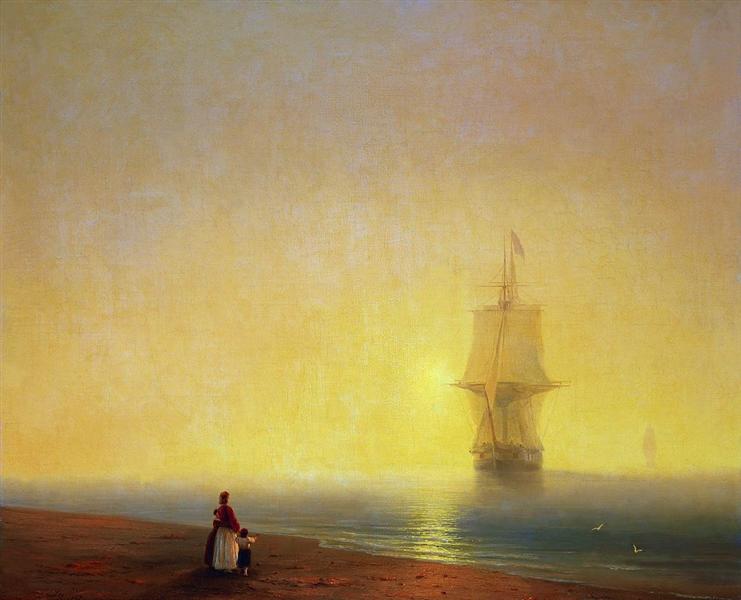Description
The work "Tomorrow at sea" by Ivan Aivazovsky, painted in 1849, is a magnificent example of the artist's virtuosity in the representation of the sea and light. This painting, which manages to capture the fragility and greatness of nature, is both a tribute and a personal interpretation of the majesty of the ocean. Aivazovsky, who is recognized for his extraordinary ability to handle water and light, introduces the viewer in a landscape where morning serenity is mixed with the magnificence of the marine environment.
From the first glance, it is evident that the work is impregnated with an atmosphere of tranquility. The color palette used by Aivazovsky plays a crucial role in the creation of this sensation. The warm tones of yellow and orange of dawn combine with the blue and green of the water, creating a contrast that is harmonious and soft. The light quality of painting is remarkable; The sunlight, which looks out on the horizon, delicately reflects on the surface of the sea, generating an almost ethereal effect. This treatment of light reflects the artist's interest in capturing not only the visual image, but also the emotional experience of being before the vastness of the ocean at dawn.
As for the composition, Aivazovsky uses an approach that guides the viewer's gaze towards the bottom of the work. The horizon line, where the sky meets the sea, is presented so that it suggests an infinite distance, inviting the viewer to enter the landscape. Aivazovsky gently positions the waves on the front, creating a sense of depth and three -dimensionality. The arrangement of the elements in the painting generates a visual balance that is characteristic of the romantic style of the artist.
Although "tomorrow at sea" it lacks human figures or narrative elements, the work manages to convey a palpable connection with human experience. The lack of characters invites contemplation, allowing each observer to perform the scene from their own emotional place. This approach frees the painting of narrative ties, leading to be a meditation space about nature, the cycles of life and the passage of time.
Ivan Aivazovsky, born in 1817 in Feodosia, Crimea, dedicated his life to studying and capturing the sea in his art. His work is registered within the romantic movement, where nature is both a subject of admiration and a space to explore human emotions. Aivazovsky's technique was innovative for his time, highlighting the use of loose brushstrokes and a luminescence that insufferates his works. "Tomorrow at sea" adds to his extensive repertoire of paintings that explore water in all its forms and states, contributing to its legacy as one of the greatest landscapers of the sea.
In conclusion, "tomorrow at sea" is more than a representation of the ocean in a dawn; It is a work that encapsulates the very essence of luminosity and serenity that Aivazovsky manages to capture with mastery. The work invites the viewer to stop and contemplate, to get carried away by the peace that the sea transmits in the morning, reminding us of the delicacy of nature and our relationship with it.
KUADROS ©, a famous paint on your wall.
Hand-made oil painting reproductions, with the quality of professional artists and the distinctive seal of KUADROS ©.
Art reproduction service with satisfaction guarantee. If you are not completely satisfied with the replica of your painting, we refund your money 100%.

